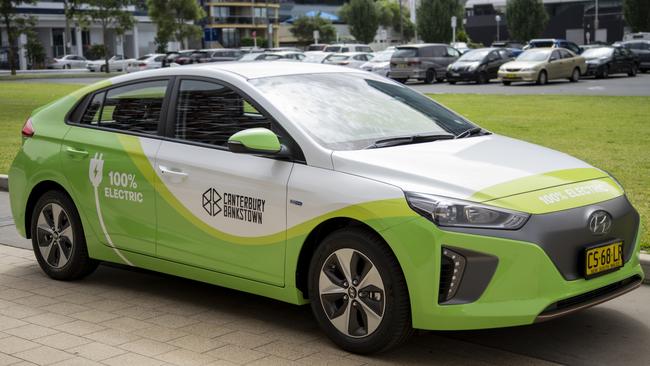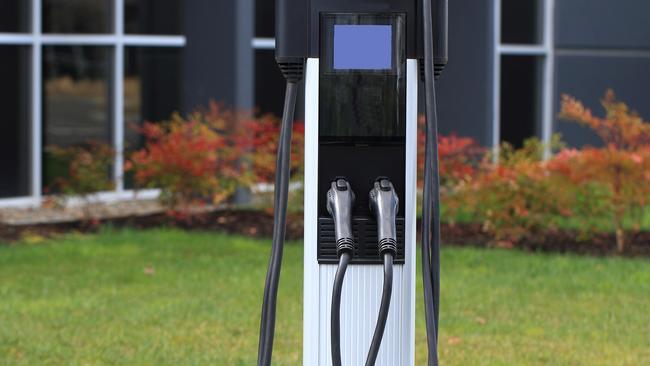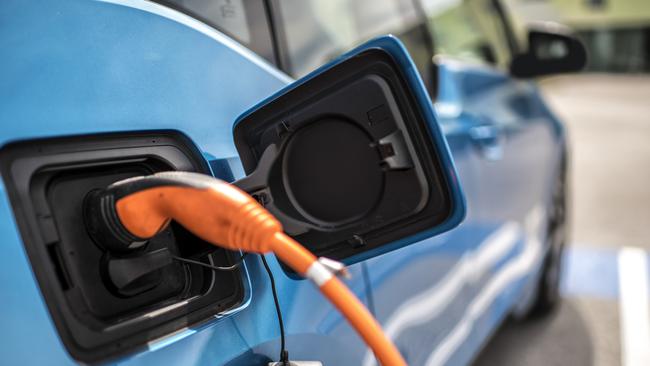Matt Johnston: Electric cars come at a cost for roads
Last week, Bill Shorten announced Labor would create a “target” in government for half of Australia’s cars to be electric by 2030. Fuel tax revenue helps to maintain our roads, but what happens if we’re all driving electric cars, writes Matt Johnston.

Opinion
Don't miss out on the headlines from Opinion. Followed categories will be added to My News.
Soon after Bill Shorten announced that Labor would create a “target” in government for half of Australia’s cars to be electric by 2030, angry social media posts started appearing.
They screamed that Labor’s policy, which has scant detail but includes vague words about vehicle emission standards, would be a “car tax”. Others used the opportunity to just get stuck into tax in general.
One post asked people to imagine an Australian who had $100 from which he or she would lose tax of $33. From the $67 left over, that person bought fuel for their car and was charged 48 per cent tax (or $32.16 plus GST it said).
FIRST LOOK INSIDE SCOMO’S CHURCH
SHORTEN ACCUSED OF FUNDING ‘MERRY-GO-ROUND’
All of the figures used in this social media post, which sums up the “fake news era”, were incorrect or made-up. Income tax is on a sliding scale depending on your annual earnings — with the first $18,200 not taxed at all. Fuel excise is about 42c a litre, not 48 per cent plus GST as purported.
None of that mattered to the group peddling the line that the government is taxing the c--- out of you and that life is hard.

The group, I found out after reading the fine print, was One Nation.
The subtext of this and other online outrages was that electric cars will cripple you even more because your fuel-guzzler will go up in price.
The more grunt your beast has, the more expensive it would be.
Such a campaign will be scarily effective with a lot of people who read it and are struggling with keeping a car on the road, let alone paying off their credit cards.
Prime Minister Scott Morrison tried a slightly different attack, saying that Shorten was effectively trying to “end the weekend”.
Apart from making me think it is only going to get easier to launch misleading scare campaigns in the future, the social media post got me thinking about fuel taxes.
An infrastructure expert I spoke to about this concept recently gave a different illustration to that presented by the One Nation post.
He asked me to picture two motorists stopped at traffic lights.
One sits in a shiny $100,000 electric vehicle and looks well-off, while the other is in a rattler run by petrol that was worth about $15,000 when bought. Only one of those motorists pays tax to keep that car running, via fuel excise.
That example was given to me as a reason why he believed a change would — and must — eventually come to the way we “pay” for road use in Australia.

Fuel excise, as mentioned above, is worth about 42c a litre for petrol and diesel. Together that is expected to pour a $78 billion into federal coffers over the next four years. On current projections, that would be about $200 billion over a decade.
Collection forecasts that boffins have hoped for over the past few years haven’t been met, probably because of fuel-efficiency improvements in cars rather than electric vehicles.
The debate about just how fast change is coming on the electric car space has gone up a notch in recent weeks, with no one entirely sure when the rate of changeover will become exponential.
Labor’s policy probably won’t do a great deal by itself, as the market is really leading the change. In reality, both sides of politics think change is driving down the road.
Treasurer Josh Frydenberg said a “global revolution in electric vehicles is underway”. He wrote that when he was environment minister in the Turnbull government.
At the moment, the cost and the look of electric vehicles put many motorists off. Cars are expensive in general, of course. First there’s buying the thing, then there’s the upkeep and of course the massive rego and insurance hit once a year.
More companies are starting to release cheaper electric cars as costs come down and batteries and other things improve, but it’s still out of most families’ reach.

Meanwhile Volkswagen, one of the biggest manufacturers, has announced a phase-out of combustion engines in the middle of the next decade. Cheaper brands like Hyundai are starting to release more electric models.
Once that eventually starts to take hold in Australia, what happens to fuel taxes?
One popular idea with boffins is to introduce road pricing instead. That is, effectively paying for roads by being charged per kilometre to drive on them. In return, registration fees and fuel excise would be dumped.
If that were to be done, federal cash from road pricing would have to be largely returned to road projects and transport initiatives.
It would require an enormous amount of federal-state co-operation and for both major parties to resist scare campaigns about big new taxes while the scheme was developed fairly.
I know, I can hear you laughing already.
When Infrastructure Victoria released a discussion paper on this concept, it was killed by the Andrews Labor Government almost before it came off the presses.
One day, though, governments might not have a choice.
If Shorten fails to win this election against a divided Coalition that has torn itself apart for five years, it will be his tax and environmental policies blamed.
And the risk-averse political culture that has taken root in Australia will grow stronger.
Matt Johnston is state politics editor.


